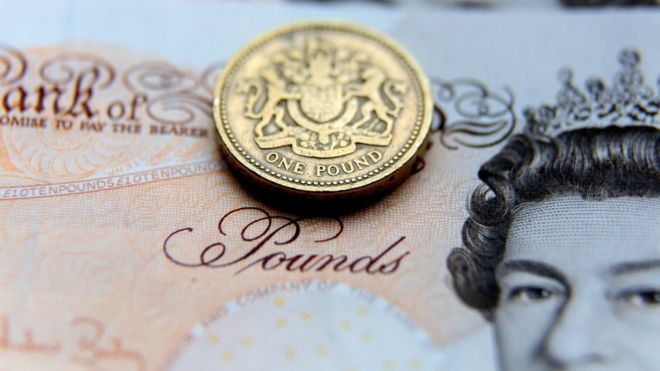Government borrowing fell in the first six months of the financial year, official figures have shown.

Public sector net borrowing excluding public sector banks was £46.3bn between April and September, down £7.5bn, or 13.9%, from a year earlier, the Office for National Statistics (ONS) reported.
In September, borrowing was £9.4bn, down £1.6bn from a year earlier.
In July, the Office for Budget Responsibility forecast the figure for the whole year would be £69.5bn.
That would be down 22.9% from the estimate of £89.2bn from 2014-15.
There was good news for the chancellor, as August's borrowing figure was revised down by £500m and July's was lowered by £2.5bn, although the figures for April and May both increased by £800m.
Analysis: Andy Verity, economics correspondent
September's public sector finances look encouraging at first sight. The government's still spending far more than its income of course. To make up the difference, it's had to borrow £46.3bn in the first six months of the financial year (April to September). But that is £7.5bn less than last year and better than most analysts expected.
This must be because of spending cuts, right?
Wrong. Spending has gone up. Departments spent 0.8% more on goods and services than last year. And spending on social benefits increased, largely because of spending on state pensions (where the triple lock promises a rise of at least 2.5% in the basic state pension).
No, it was higher tax receipts that improved the position. Income tax, national insurance and VAT receipts grew faster than the economy - by at least 4%. And, notably, corporation tax receipts rose by 7.9%.
But while there has been a cut in the amount the government has to borrow to cover its spending, it's not deep enough to hit the target. The chancellor is aiming to get borrowing down to £69.5bn for the whole year, a 23% cut. So far this year, in spite of the improved tax receipts, it's only down by 14%.
The ONS warns it is hard to use the figures for the year so far to estimate whether the government is on track to meet the OBR forecast. There are still six months of data to come, and much depends on the spike in tax receipts that is usually seen in January.
Vicky Redwood at Capital Economics said: "If the current trend continues, borrowing in 2015-16 as a whole will come in at about £78bn, much lower than 2014-15's total.
"Admittedly, this would be above the OBR's forecast... but there is still plenty of the fiscal year to go. So there's no need for the chancellor to panic yet."
However, Samuel Tombs at Pantheon Macroeconomics said: "The fiscal consolidation is still not going to plan and we think the chancellor will have to announce more austerity in time if he is to achieve his goal of a budget surplus by 2019-20."
No comments:
Post a Comment